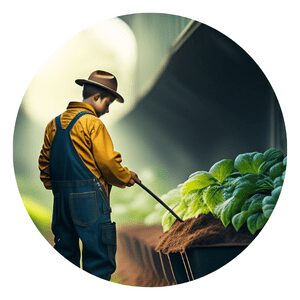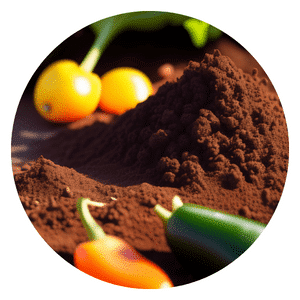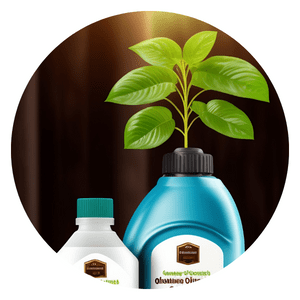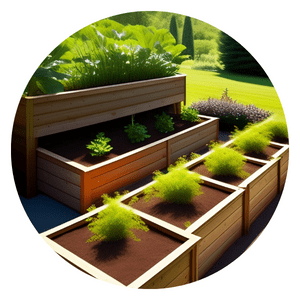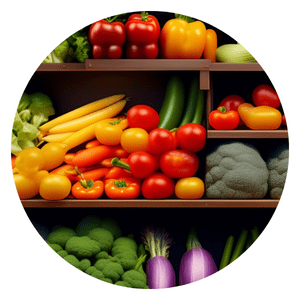Growing Vegetables in Kentucky: Perfect Choices for Your Garden
Kentucky, known as the Bluegrass State, is not only renowned for its lush pastures and rolling hills but also for its fertile soils that provide an ideal setting for growing a variety of vegetables.
With its temperate climate and ample rainfall, Kentucky presents an excellent opportunity for gardeners to cultivate their own fresh produce right in their backyard.
Whether you are an experienced gardener or just starting your journey into vegetable gardening, this article will guide you through the perfect choices of vegetables to grow in Kentucky’s unique growing conditions.
From leafy greens to robust root crops, let us explore the bountiful possibilities of vegetable gardening in the beautiful state of Kentucky.

Kentucky Vegetables Gardening Menu
Tomatoes (Solanum lycopersicum)
Tomatoes (Solanum lycopersicum) are an incredibly popular vegetable to grow in Kentucky due to the state’s warm summers.
The long, hot days provide the ideal conditions for tomato plants to flourish and produce a bountiful harvest.
With plenty of sunshine and heat, these plants can grow vigorously, resulting in juicy, flavorful fruits.
In addition to the favorable climate, tomatoes also thrive in well-drained, loamy soil. This type of soil provides good drainage while retaining enough moisture for the plants’ needs.
It allows water to flow through easily without becoming waterlogged, preventing issues such as root rot or other diseases caused by excess moisture.
Loamy soil also offers a balanced mixture of sand, silt, and clay particles that provide essential nutrients and promote healthy root development.
When it comes to growing tomatoes in Kentucky’s gardens, it is crucial to choose suitable varieties that are well-suited for the region’s climate and conditions.
There are numerous types available that excel in warm climates like Kentucky’s.
By selecting the right varieties and providing optimal growing conditions such as well-drained soil and ample sunlight exposure, gardeners can enjoy a successful tomato harvest year after year.
Green Beans (Phaseolus vulgaris)
Green beans, also known as Phaseolus vulgaris, are a popular vegetable choice for many gardeners in Kentucky.
These hardy legumes thrive in the state’s fertile soil and can be grown as both bush and pole varieties.
Bush green beans are compact plants that do not require support and are perfect for small gardens or containers.
On the other hand, pole green beans need trellises or stakes to climb on and can reach impressive heights, making them ideal for larger spaces.
One of the great advantages of growing green beans in Kentucky is their adaptability to different soil types.
Whether you have sandy loam or heavy clay soil, these legumes can still flourish with proper care.
Additionally, green beans are relatively low maintenance plants that only require regular watering and occasional fertilizing to produce an abundant harvest.
In terms of variety selection, there is a wide range available for Kentucky gardeners to choose from.
Classic favorites such as Blue Lake or Provider offer excellent taste and high yields.
For those interested in heirloom varieties, Kentucky Wonder or Rattlesnake green beans provide a unique twist with their delicious flavor profiles.
Overall, whether you opt for bush or pole varieties, growing green beans in Kentucky offers a rewarding gardening experience with bountiful harvests of this versatile and nutritious vegetable.
Bell Peppers (Capsicum annuum)
Bell peppers are a popular vegetable choice for gardeners in Kentucky due to the state’s sunny and humid climate.
The warm temperatures and ample sunlight provide ideal conditions for bell pepper plants to thrive and produce abundant yields.
Additionally, the use of raised beds with good drainage further enhances the growth of these vegetables.
Raised beds are particularly beneficial for growing bell peppers in Kentucky as they allow for better control over soil quality and moisture levels.
The well-draining nature of raised beds prevents waterlogging, which can lead to root rot and other diseases that may hinder plant growth. Moreover, proper drainage ensures that excess water is efficiently removed from the root zone, preventing the development of fungal infections.
Kentucky’s sunny and humid climate combined with the use of raised beds with good drainage makes it an excellent environment for growing bell peppers.
Gardeners can take advantage of these favorable conditions to cultivate healthy plants that yield a bountiful harvest year after year.
In Kentucky's rich and fertile soil, Where the sunrays gently toil, Sprouts a garden so verdant and bright, With vegetables, a joyful sight. Tomatoes ripen in hues of red, Cornfields sway with grace, beaming ahead. Oh, Kentucky's glory knows no bounds, Bountiful harvests, nature surrounds.
Chappy The Gardener
Cucumbers (Cucumis sativus)
Cucumbers (Cucumis sativus) are an excellent choice for any Kentucky garden, thanks to the state’s fertile soil and favorable growing conditions.
With proper watering and ample sunlight, cucumbers can thrive in this region. They require at least 6-8 hours of direct sunlight each day to develop into healthy plants.
In addition to sunlight, cucumbers also need consistent watering.
The ideal soil moisture level for cucumbers is about one inch per week.
It is important to water deeply and regularly, ensuring that the soil remains consistently moist but not waterlogged.
Mulching around cucumber plants can help retain moisture in the soil, preventing evaporation during hot summer days.
Kentucky’s rich soils provide an abundance of nutrients necessary for cucumber growth.
However, it is still recommended to amend the soil with compost or well-rotted manure before planting cucumbers. This will further enrich the soil and improve its drainage properties, creating optimal conditions for cucumber roots to grow deep and develop a strong foundation.
With these simple care practices in place, your cucumber plants will produce a bountiful harvest throughout the growing season in Kentucky’s gardens.
Lettuce (Lactuca sativa)
Cooler spring and fall temperatures in Kentucky create ideal conditions for growing a wide range of lettuce varieties.
Lettuce (Lactuca sativa) thrives in cooler temperatures, as it is a cool-season crop that prefers temperatures between 45°F and 75°F.
The mild climate in Kentucky during these seasons provides the necessary conditions for lettuce to flourish.
Kentucky gardeners have the opportunity to grow an assortment of lettuce types, including loose-leaf, butterhead, romaine, and crisphead varieties. These different types offer various textures, flavors, and colors to enhance any salad or sandwich.
With the cooler temperatures found in Kentucky during spring and fall, lettuces tend to stay crisper and more flavorful compared to those grown in hotter regions.
Furthermore, the extended growing season provided by Kentucky’s climate allows gardeners to enjoy fresh homegrown lettuce for an extended period.
By planting multiple successions of lettuce throughout the spring and fall months, gardeners can ensure a continuous harvest of this nutritious leafy green vegetable.
With its versatility and ability to thrive in cooler weather conditions, lettuce is undoubtedly an excellent choice for any Kentucky garden.
Zucchini (Cucurbita pepo)
Zucchini (Cucurbita pepo) is a popular vegetable to grow in Kentucky due to its ability to thrive in the warm summer temperatures and well-drained soil.
The state’s climate provides an ideal environment for zucchini growth, allowing gardeners to enjoy a bountiful harvest throughout the summer months.
With proper care and attention, zucchini plants can produce an abundant yield of this versatile vegetable.
In addition to the favorable growing conditions, zucchini is also a great choice for Kentucky gardens because it is relatively easy to cultivate.
The plants require full sun and regular watering, but they are generally low maintenance compared to other vegetables.
Zucchini can be grown from seeds or transplants and should be spaced adequately apart to allow room for their sprawling vines.
By providing adequate support such as trellises or cages, gardeners can maximize space utilization while ensuring good air circulation around the plants.
One of the benefits of growing zucchini in Kentucky is its fast growth rate.
Zucchini plants typically begin producing fruits within 45-55 days after planting, making it one of the quickest-growing vegetables in the garden. This rapid growth allows gardeners to enjoy fresh zucchinis early in the season and continue harvesting throughout summer until frost arrives.
Whether used raw in salads or cooked into various dishes, zucchinis’ mild flavor and tender texture make them a versatile addition to any kitchen.
Spinach (Spinacia oleracea)
Spinach (Spinacia oleracea) is a versatile and nutritious cool-season vegetable that thrives in the mild winters of Kentucky.
The state’s climate allows for winter spinach cultivation, providing gardeners with the opportunity to enjoy fresh greens even during the colder months.
Winter spinach is known for its tender leaves and mild flavor, making it a favorite choice among many gardeners.
One of the advantages of growing spinach in Kentucky’s mild winters is its ability to withstand frost.
While other vegetables might suffer damage or die off when temperatures drop, spinach can tolerate cold temperatures and continue to grow. This resilience makes it an ideal choice for those looking to extend their gardening season or have a continuous supply of fresh greens throughout the year.
Additionally, winter spinach cultivation in Kentucky offers various benefits beyond its hardiness.
Spinach is packed with vitamins A, C, and K, as well as iron and calcium, making it a nutrient-dense addition to any diet.
Its versatility also makes it suitable for various culinary uses such as salads, sautés, soups, and smoothies.
By growing spinach during the winter months in Kentucky, gardeners can enjoy not only its nutritional value but also its delicious taste throughout the entire year.
Squash (Cucurbita spp.)
One of the perfect choices for your garden in Kentucky is squash.
Both summer and winter squash varieties can thrive in the state’s soil and climate.
Summer squash, such as zucchini and yellow crookneck, are warm-season vegetables that can be planted directly in the ground after the last frost date. They grow quickly and produce abundant fruits throughout the summer months.
Winter squash, on the other hand, have a longer growing season and require more space to spread out.
Varieties like butternut, acorn, and spaghetti squash can be harvested in late summer or early fall when their outer skin becomes hard. These types of squash store well over the winter months if kept in a cool, dry place.
Squash plants are relatively easy to grow as long as they receive sufficient sunlight (at least six hours per day) and regular watering. They also benefit from well-drained soil enriched with organic matter.
With proper care and attention to pest control measures, you can enjoy a bountiful harvest of delicious summer and winter squashes right from your own garden in Kentucky.
Radishes (Raphanus sativus)
Radishes are a popular choice for gardeners in Kentucky due to their ability to thrive in the state’s cool spring and fall weather.
These quick-growing root vegetables can be harvested just a few weeks after planting, making them an ideal option for those who want fast results.
Radishes come in various shapes, sizes, and colors, including red, white, purple, and even black.
In addition to their speedy growth, radishes are also relatively low maintenance compared to other vegetables.
They require minimal care and attention but still produce abundant crops. This makes them an excellent choice for beginner gardeners or those with limited time and space.
Furthermore, radishes offer numerous health benefits. They are rich in vitamins C and B6 as well as potassium and fiber.
Incorporating radishes into your diet can help boost your immune system, improve digestion, and promote overall wellbeing.
Overall, if you’re looking for a versatile vegetable that is easy to grow and provides numerous health benefits, radishes are an excellent choice to consider adding to your Kentucky garden.
Broccoli (Brassica oleracea)
Broccoli, a member of the cabbage family, is a nutritious and delicious vegetable that can thrive in Kentucky with proper soil preparation and cooler temperatures.
To grow broccoli successfully in this region, it is important to choose a site that receives full sun for at least six hours a day. The soil should be well-draining and rich in organic matter.
Adding compost or well-rotted manure before planting will improve the soil’s fertility and drainage.
Start by sowing broccoli seeds indoors about 6-8 weeks before the last expected frost date.
Once the seedlings have grown to around four inches tall, they can be transplanted outdoors.
It is crucial to time the transplanting so that it happens when the plants are still young and vigorous but not too tender to withstand any late frosts that may occur in Kentucky’s unpredictable spring weather.
To protect broccoli plants from extreme heat during summer, consider providing shade using row covers or temporary structures like umbrellas or shade cloth.
Mulching around the plants will help conserve moisture and suppress weeds. Regular watering is essential for healthy growth, aiming to keep the soil evenly moist without becoming waterlogged.
With these preparations and attention to timing, growing broccoli in Kentucky can yield bountiful harvests of this versatile vegetable throughout its growing season from early spring until fall frosts arrive.
Kale (Brassica oleracea)
Kale, also known as Brassica oleracea, is a popular vegetable that thrives in Kentucky’s cool fall and spring temperatures.
It is a cold-hardy leafy green that can withstand frost and even snow, making it an excellent choice for gardeners in the state.
One of the great things about kale is its versatility. It can be grown in both raised beds and containers, making it suitable for gardens of all sizes.
Plus, there are numerous varieties to choose from, ranging from curly kale to lacinato (also known as dinosaur) kale.
In addition to being easy to grow, kale is also packed with nutrition. It is rich in vitamins A, C, and K, as well as minerals like calcium and magnesium.
Moreover, it contains powerful antioxidants that help protect against various diseases.
Whether you want to add some color to your garden or nourish your body with healthy greens, growing kale in Kentucky’s cool climate is a smart choice.
With proper care and attention, you can enjoy fresh homegrown kale throughout the fall and spring seasons.
Peas (Pisum sativum)
Peas (Pisum sativum) are a perfect choice for your garden in Kentucky, thanks to the mild spring temperatures and well-draining soil that the state offers.
With early planting possible, you can enjoy an extended growing season for these delicious legumes.
Peas thrive in cool weather and prefer temperatures between 55°F and 75°F, making them ideal candidates for Kentucky’s climate.
The well-draining soil in the state is also beneficial for pea plants.
Peas require soil with good drainage to prevent waterlogged roots, which can lead to rotting and disease.
The sandy loam or loamy soils commonly found in Kentucky provide excellent drainage while still retaining enough moisture for healthy plant growth.
When planting peas in Kentucky, it is recommended to sow them directly into the ground as soon as the soil can be worked in early spring. This allows ample time for them to mature before high summer temperatures arrive.
Consider using trellises or other supports to help pea plants climb and keep their vines off the ground, promoting better air circulation and reducing pest problems.
If you’re looking to grow vegetables in Kentucky, peas are a fantastic choice.
The state’s mild spring temperatures and well-draining soil create an optimal environment for these legumes to thrive.
Enjoy an extended growing season by planting peas early and provide support structures such as trellises to maximize their growth potential.
In conclusion, growing vegetables in Kentucky can be a rewarding and fruitful experience.
With the state’s diverse climate and fertile soil, there are plenty of perfect choices for your garden.
Whether you prefer traditional favorites like tomatoes and cucumbers or want to experiment with unique varieties like pawpaws and sorrel, Kentucky offers a wealth of options for every gardener.
By following proper planting techniques and providing adequate care, you can enjoy a bountiful harvest of homegrown vegetables throughout the growing season.
So why wait? Start planning your vegetable garden today and reap the benefits of fresh, delicious produce right at your doorstep.
Click To Grow
Helps Us Grow – Share If You Like


